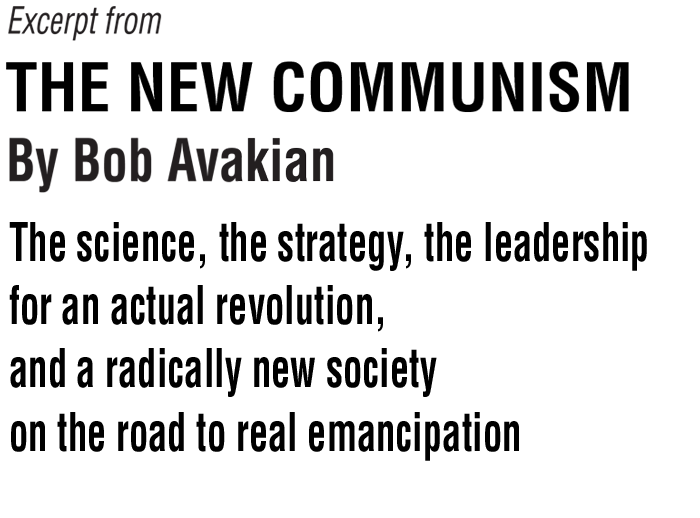
Excerpt from the sections:
Internationalism and an International Dimension
and
Internationalism—Revolutionary Defeatism
Editors' note: The following is an excerpt from the new work by Bob Avakian, The New Communism. In addition to excerpts already posted on revcom.us, we will be running further excerpts from time to time on both revcom.us and in Revolution newspaper. These excerpts should serve as encouragement and inspiration for people to get into the work as a whole, which is available as a book from Insight Press. A prepublication copy is available on line at revcom.us.
This excerpt comes from the section titled "III. The Strategic Approach to An Actual Revolution."
From the section:
Internationalism and an International Dimension
In addition to what has been said about how, when it comes down to the struggle for the seizure of power, there will be aspects of a civil war between two sections of the people—and in addition to what has been emphasized about the need to deal with the problem of encirclement, suppression and pulverization—another dimension of this that has to be taken into consideration is that this will not only be a struggle that must be internationalist in its basic orientation, but it is also likely to have a significant aspect of being international. The point has been made that the borders of this country are anything but sacred to us. If you look at the Constitution for the New Socialist Republic, specifically in regard to what is now the Southwest of the U.S., you can see that it is taking account of the close interconnection—historically, in the present time, and looking to the future—between what goes on in (what is now) the U.S., and what goes on to the south. And, given that, when it comes down to it, there would almost certainly be, in significant measure, the interconnection and interpenetration of revolutionary struggle in (what is now) the U.S. and revolutionary struggle to the south, strategic thinking and work needs to be carried out, in terms of the international dimension of this.
From the section:
Internationalism—Revolutionary Defeatism
What do I mean by revolutionary defeatism, and why is it so important? Revolutionary defeatism means that you oppose the actions of your own government and ruling class in carrying out their wars, which are wars for empire. It means that you welcome any setbacks they suffer in those wars, because that weakens their oppressive hold over masses of people, here and in the world more generally. Now, we do have to recognize that we have a different situation than back in the day with the war in Vietnam. In those days, the National Liberation Front (NLF) in Vietnam was a revolutionary organization of the people in South Vietnam who were waging the fight, along with the government and people in North Vietnam, against the U.S. imperialists. And the leader of that struggle, until he died in the late 1960s, was Ho Chi Minh, who called himself a communist but was actually more of a revolutionary nationalist. Beginning soon after the end of World War 2, Ho Chi Minh led the armed struggle of the Vietnamese people to drive out the French, who had colonized Vietnam, and then to drive out the Americans, who, beginning in the 1950s, attempted to replace the French as the colonial master of Vietnam. Now, back in those days we used to go to demonstrations and people would march through the streets chanting, “Ho, Ho, Ho Chi Minh, NLF is gonna win.” It felt very good, and it was right to do it. It was right to be on the side of the Vietnamese people and Ho Chi Minh leading them. It wasn’t just that you wanted your government to lose the unjust war it was waging, you could actually be on the side of the people fighting against your government, because those people represented a righteous cause, they represented a real struggle against imperialism. They weren’t going around attacking civilians. They were fighting against the military of U.S. imperialism that had invaded their country and was bombing it massively. So, in those days, you could actually be with the people fighting against the U.S. government, the U.S. imperialists.
Today, unfortunately, the situation is different and not as favorable in the short run. Nobody coming from a decent place should want to root for these reactionary Islamic jihadists who are in fact also enforcers of brutally oppressive relations—particularly, but not only, horrific patriarchal relations—and who, in the service of that, carry out all kinds of depraved slaughter of ordinary civilians. So you cannot, if you’re coming from the right place, identify in any way with these forces and support them. Now, there are some people around the world who call themselves leftists or even communists or Maoists, people like this guy Ajith, who try to put a pretty face on these Islamic fundamentalist jihadists and insist that they are anti-imperialists, that they’re waging an anti-imperialist struggle. But the fact is that, while they may fight against the U.S., they do not represent a positive, progressive, let alone a revolutionary force; and where they have succeeded in exercising power, their rule is brutally oppressive. That has been shown repeatedly in the real world. In your mind, you can try to make these people into something other than what they are, but that can only do a great deal of harm, because in the real world they are not a positive force, even while, coming from where they’re coming from, they’re opposing U.S. imperialism, to some degree, although not in any thoroughgoing way and not toward any positive end.
This makes for a difficult situation because, especially given how parasitic U.S. society is—where significant sections of the people, particularly among the middle strata, receive some share of the spoils from imperialist domination and plunder in the world—when the U.S. government is able to point to the continuing atrocities carried out by these Islamic fundamentalists, this reinforces the tendency for people to side with, or at least not to seriously oppose, their own country and government in the wars it is waging against these Islamic fundamentalists. It makes it easier for people to go along with what is, and take the position: “I don’t really like these wars, but look at these other people; we have to do something about groups like ISIS.” Never mind the fact that Saudi Arabia, a big ally of the U.S., beheads a lot more people than ISIS does, and embodies and enforces all kinds of horrendous oppression, against women and others. But still, people can say, “Well, look at these people, like ISIS.” This makes it easier for people not to do the hard thing of going up against their own government in the wars it is waging.
Yes, it is true: the Islamic fundamentalists who are opposing these imperialists are no good, they don’t pose a positive alternative. But that does not make the wars of empire being fought by this government just wars. This situation has gone on way too long and needs to be frontally and deeply challenged. These are wars for empire. These are unjust wars. They are carried out with massive means of destruction, killing civilians in the hundreds of thousands, torturing people in the service of these wars. This should be opposed and opposed strongly. It is not acceptable that people just take the stand, “Yes, I wish those wars would be over with, but we gotta do something about these Islamic fundamentalists.” It is crucial that people come to see what the nature of these wars being waged by their government actually is, and why these wars have to be actively opposed; and even if you can’t, and shouldn’t, support the other side, you still have to have the basic approach of welcoming the defeat of your own government in the wars it is waging. The defeat of these imperialists should be welcomed because, number one, their wars are unjust, even if the people opposing them are also unjust. And, two, every such defeat weakens this system and its ruling class and brings closer the time when people can actually bring it down and bring something liberating into being in its place.
Contents
Publisher's Note
Introduction and Orientation
Foolish Victims of Deceit, and Self-Deceit
Part I. Method and Approach, Communism as a Science
Materialism vs. Idealism
Dialectical Materialism
Through Which Mode of Production
The Basic Contradictions and Dynamics of Capitalism
The New Synthesis of Communism
The Basis for Revolution
Epistemology and Morality, Objective Truth and Relativist Nonsense
Self and a “Consumerist” Approach to Ideas
What Is Your Life Going to Be About?—Raising People’s Sights
Part II. Socialism and the Advance to Communism:
A Radically Different Way the World Could Be, A Road to Real Emancipation
The “4 Alls”
Beyond the Narrow Horizon of Bourgeois Right
Socialism as an Economic System and a Political System—And a Transition to Communism
Internationalism
Abundance, Revolution, and the Advance to Communism—A Dialectical Materialist Understanding
The Importance of the “Parachute Point”—Even Now, and Even More With An Actual Revolution
The Constitution for the New Socialist Republic in North America—
Solid Core with a Lot of Elasticity on the Basis of the Solid Core
Emancipators of Humanity
Part III. The Strategic Approach to An Actual Revolution
One Overall Strategic Approach
Hastening While Awaiting
Forces For Revolution
Separation of the Communist Movement from the Labor Movement, Driving Forces for Revolution
National Liberation and Proletarian Revolution
The Strategic Importance of the Struggle for the Emancipation of Women
The United Front under the Leadership of the Proletariat
Youth, Students and the Intelligentsia
Struggling Against Petit Bourgeois Modes of Thinking, While Maintaining the Correct Strategic Orientation
The “Two Maximizings”
The “5 Stops”
The Two Mainstays
Returning to "On the Possibility of Revolution"
Internationalism—Revolutionary Defeatism
Internationalism and an International Dimension
Internationalism—Bringing Forward Another Way
Popularizing the Strategy
Fundamental Orientation
Part IV. The Leadership We Need
The Decisive Role of Leadership
A Leading Core of Intellectuals—and the Contradictions Bound Up with This
Another Kind of “Pyramid”
The Cultural Revolution Within the RCP
The Need for Communists to Be Communists
A Fundamentally Antagonistic Relation—and the Crucial Implications of That
Strengthening the Party—Qualitatively as well as Quantitatively
Forms of Revolutionary Organization, and the “Ohio”
Statesmen, and Strategic Commanders
Methods of Leadership, the Science and the “Art” of Leadership
Working Back from “On the Possibility”—
Another Application of “Solid Core with a Lot of Elasticity on the Basis of the Solid Core”
Appendix 1:
The New Synthesis of Communism:
Fundamental Orientation, Method and Approach,
and Core Elements—An Outline
by Bob Avakian
Appendix 2:
Framework and Guidelines for Study and Discussion
Notes
Selected List of Works Cited
About the Author
 Download PDF of entire work
Download PDF of entire work